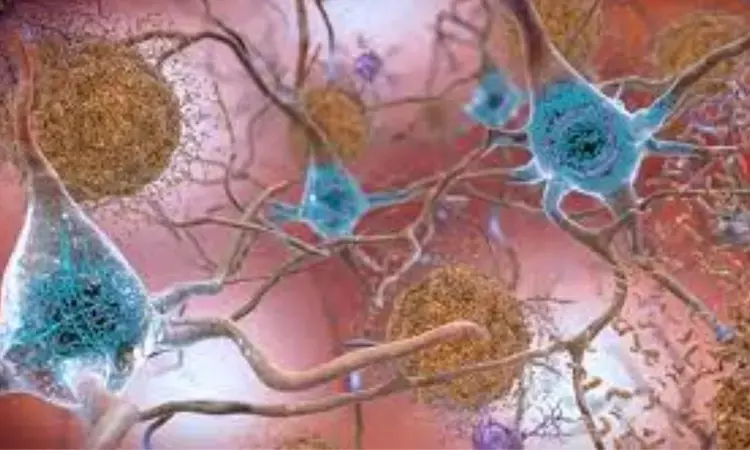- Home
- Medical news & Guidelines
- Anesthesiology
- Cardiology and CTVS
- Critical Care
- Dentistry
- Dermatology
- Diabetes and Endocrinology
- ENT
- Gastroenterology
- Medicine
- Nephrology
- Neurology
- Obstretics-Gynaecology
- Oncology
- Ophthalmology
- Orthopaedics
- Pediatrics-Neonatology
- Psychiatry
- Pulmonology
- Radiology
- Surgery
- Urology
- Laboratory Medicine
- Diet
- Nursing
- Paramedical
- Physiotherapy
- Health news
- Fact Check
- Bone Health Fact Check
- Brain Health Fact Check
- Cancer Related Fact Check
- Child Care Fact Check
- Dental and oral health fact check
- Diabetes and metabolic health fact check
- Diet and Nutrition Fact Check
- Eye and ENT Care Fact Check
- Fitness fact check
- Gut health fact check
- Heart health fact check
- Kidney health fact check
- Medical education fact check
- Men's health fact check
- Respiratory fact check
- Skin and hair care fact check
- Vaccine and Immunization fact check
- Women's health fact check
- AYUSH
- State News
- Andaman and Nicobar Islands
- Andhra Pradesh
- Arunachal Pradesh
- Assam
- Bihar
- Chandigarh
- Chattisgarh
- Dadra and Nagar Haveli
- Daman and Diu
- Delhi
- Goa
- Gujarat
- Haryana
- Himachal Pradesh
- Jammu & Kashmir
- Jharkhand
- Karnataka
- Kerala
- Ladakh
- Lakshadweep
- Madhya Pradesh
- Maharashtra
- Manipur
- Meghalaya
- Mizoram
- Nagaland
- Odisha
- Puducherry
- Punjab
- Rajasthan
- Sikkim
- Tamil Nadu
- Telangana
- Tripura
- Uttar Pradesh
- Uttrakhand
- West Bengal
- Medical Education
- Industry
Complete amyloid plaque clearance with donanemab slows progression of Alzheimer's disease: JAMA

USA: Baseline amyloid levels are inversely associated with chances of achieving complete amyloid clearance and directly related to the magnitude of amyloid reduction, according to results of post hoc analyses for donanemab-treated participants (with Alzheimer's disease). The study was produced in a recent issue of JAMA Neurology.
Exploratory post hoc analyses of the TRAILBLAZER-ALZ -- Study of LY3002813 in Participants With Early Symptomatic Alzheimer's Disease -- shed light on the potential associations between amyloid lowering, tau pathology, and clinical outcomes.
Donanemab is an immunoglobulin G1 antibody specific for an epitope exclusively present in mature brain amyloid plaques. Treatment with donanemab resulted in rapid and profound clearance of amyloid plaques, as demonstrated by [18F] florbetapir positron emission tomography (PET) in phase 1 studies.
TRAILBLAZER-ALZ trial was a double-blind, multicenter, placebo-controlled, phase 2, randomized clinical trial that evaluated the safety and efficacy of donanemab in people with early symptomatic Alzheimer's disease (AD) having intermediate tau and elevated amyloid deposition on PET. It was designed to ease the rapid removal of amyloid plaques in the early phase of the trial and therefore to maximize the time at lowered plaque load and enhance the opportunity for detecting clinical benefit.
Sergey Shcherbinin, Eli Lilly and Company, Indianapolis, Indiana, and colleagues conducted the study intending to perform post hoc analyses of amyloid reduction after donanemab treatment and examine its association with tau pathology and clinical measures.
The TRAILBLAZER-ALZ study was conducted at 56 centers in the US and Canada. It enrolled participants aged 60 to 85 with gradual and progressive change in memory function for six months, elevated amyloid, early symptomatic Alzheimer's disease, and intermediate tau levels.
Donanemab dosing was performed every four weeks: 700 mg for the first three doses, then 1400 mg for up to 72 weeks. Based on amyloid clearance, blinded dose-reduction evaluations were done at 24 and 52 weeks.
Primary outcomes and measures included change in amyloid, tau, and clinical decline following donanemab treatment.
Following were the study's key results:
- The primary study was randomization of 272 participants (mean age, 75.2 years; 145 female participants [53.3%]). The trial excluded 1683 of 1955 individuals screened.
- The rate of donanemab-induced amyloid reduction at 24 weeks was moderately correlated with the amount of baseline amyloid (Spearman correlation coefficient r, −0.54).
- Modeling suggests that amyloid would not reaccumulate to the 24.1-centiloid threshold for 3.9 years after discontinuing donanemab treatment.
- Donanemab slowed tau accumulation in a region-dependent manner as measured using neocortical and regional standardized uptake value ratios with cerebellar gray reference region.
- A disease-progression model found a significant association between percentage amyloid reduction and change on the integrated Alzheimer Disease Rating Scale only in apolipoprotein E (APOE) ε4 carriers.
"Complete amyloid plaque clearance achieved with donanemab was tied to lower amyloid at baseline and slower disease progression at 76 weeks," the researchers wrote.
"These results underscore the importance of amyloid plaques in AD and understanding amyloid status for treatment decisions," they conclude. "Data from other trials, e.g., TRAILBLAZER-EXT, TRAILBLAZER-ALZ 2, and TRAILBLAZER-ALZ 4, will be critical to confirm the observations above."
Reference:
Shcherbinin S, Evans CD, Lu M, et al. Association of Amyloid Reduction After Donanemab Treatment With Tau Pathology and Clinical Outcomes: The TRAILBLAZER-ALZ Randomized Clinical Trial. JAMA Neurol. Published online September 12, 2022. doi:10.1001/jamaneurol.2022.2793
Dr Kamal Kant Kohli-MBBS, DTCD- a chest specialist with more than 30 years of practice and a flair for writing clinical articles, Dr Kamal Kant Kohli joined Medical Dialogues as a Chief Editor of Medical News. Besides writing articles, as an editor, he proofreads and verifies all the medical content published on Medical Dialogues including those coming from journals, studies,medical conferences,guidelines etc. Email: drkohli@medicaldialogues.in. Contact no. 011-43720751


